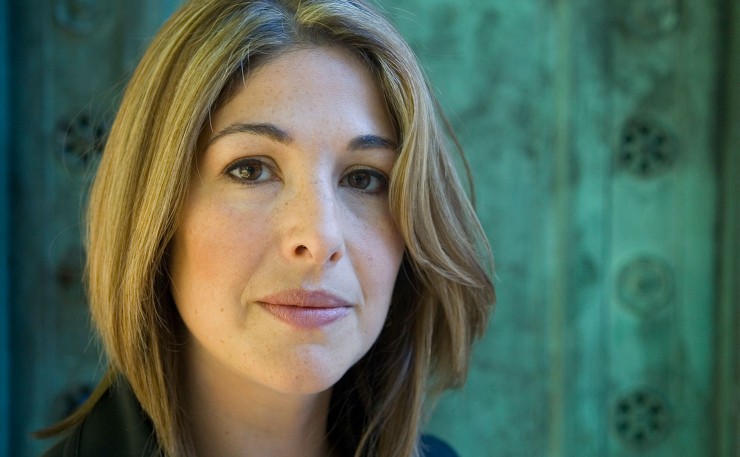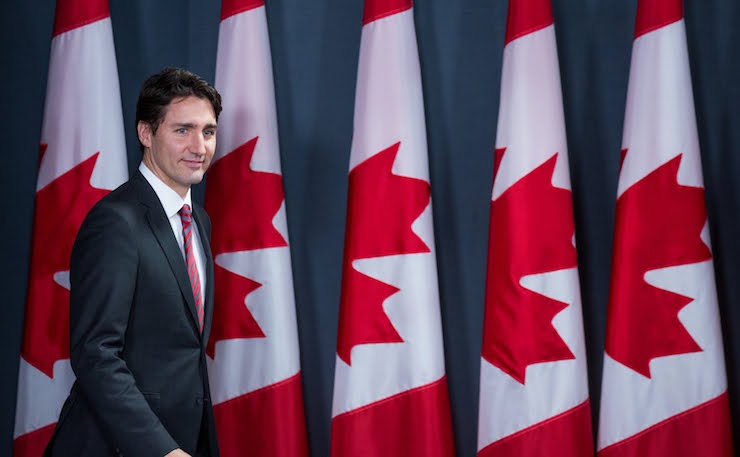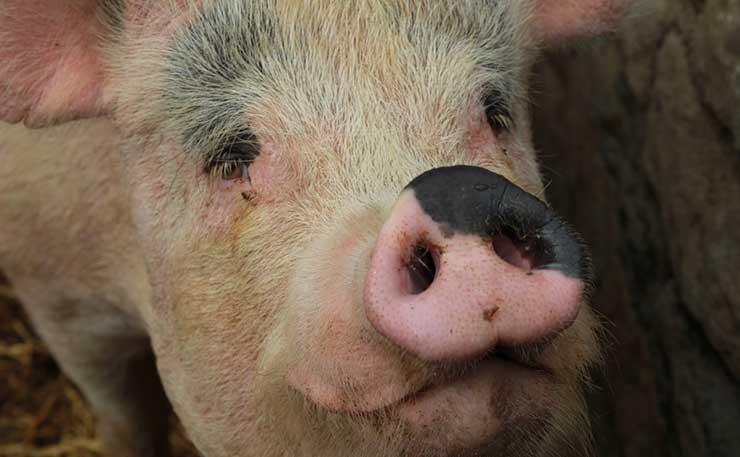For decades, the left has largely lacked a unifying progressive vision. Now Canada has the Leap Manifesto, the establishment is losing its mind. Liam McLoughlin interviewed Leap activist Bianca Mugyenyi to find out more.
My favourite thing about capitalism is freedom of choice. As an Australian, you can be ruled by a government which tortures asylum seekers in island prison camps, or you can be ruled by the Coalition. As an American, you can vote for the political party whose adherence to neoliberalism has been a significant driver of global climate change, or you can vote Republican.
Across all the great Western capitalist democracies, you’re free to choose between the pig or the pig with lipstick.
You could of course consider more humane, greener alternatives beyond the two-party system, but doing so would be radical, insane, or radically insane.
Since the early 1980s, the international neoliberal establishment has been wildly successful in marginalising the left and constraining the political vision of progressives. Under governments from Thatcher to Blair, Howard to Gillard, Reagan to Obama, it really has seemed like there is no alternative.
In Canada at least, this is starting to change.
In September of 2015, a broad coalition of Canada’s Indigenous rights, social and food justice, labour and faith-based movements presented the Leap Manifesto, “a transformative agenda to come from outside electoral politics to build a wave of popular support that will put real pressure on the federal Liberal government”.
The document makes 15 demands ranging from respecting the rights of Indigenous peoples, to urgently transitioning to a renewable economy, to welcoming refugees, to expanding low-carbon professions like caregiving, teaching, the arts and public interest media.
It’s well worth reading the manifesto in full here.
Co-ordinated by This Changes Everything, an organisation born out of Naomi Klein’s book and Avi Lewis’s film of the same name, the Leap offers not just a sharp critique of the status quo, but a positive and inspiring vision for diverse progressive voices and organisations to rally around.

In just over a year, advocated by some of Canada’s most prominent activists and artists, this combination of systemic critique and political imagination has made waves in the Canadian public sphere.
I sat down at a Montreal café with the Outreach Lead for the Leap Manifesto, Bianca Mugyenyi, to learn more.
A Bolder Climate Movement
The Leap at least partly takes its name from the bold action demanded by the climate crisis.
“If we’re going to avoid catastrophic climate change then we need to act really quickly; incremental steps are not enough anymore,” Mugyenyi says.
Surviving climate change means leaping, not ambling, to a renewable future. You see that kind of boldness across many aspects of the Leap movement. You see it in the specific demands of the manifesto.
“While the Leap is not explicitly anti-capitalist or particularly ideological, the concrete demands that it makes certainly challenge capitalism. They challenge corporate power. The call for no new fossil fuel infrastructure is a direct threat to profit, as is the call for the removal of corporate money from elections.”
You see it in the goal of the Leap team to mobilise a diverse alliance of organisations which can build momentum behind this bold vision.
“We need everybody in this fight. It’s the fight of our generation. For that reason, we need to build coalitions, bust across silos – none of this traditional single issue environmental organising – it’s not going to cut it, it hasn’t cut it.”
You even see it in the willingness of Leap spokespeople like Mugyenyi to offer a direct critique of capitalism.
“The logic of capitalism, of endless growth and conspicuous consumption, has gotten us into this ecological mess and the social inequalities we face. So I think there’s no way around confronting capitalism. The economic system is the problem.
“Capitalism, fossil fuels, the mentality of extraction, is bad for people; it makes our cities less liveable, it reduces our quality of life, our health, our relationships, it alienates us from each other, from everything around us and it’s making our world uninhabitable.”
From Capitalist Crocks to Native Narratives
Most of all, you see boldness in the Leap’s ambition to replace the seminal stories we tell ourselves in capitalist societies.
“Changing our story is so much of what Leap is about,” Mugyenyi says.
Leap Canada aims to help us transition from capitalist myths about endless extraction to an emphasis on caring for people and the planet.
“That caring is the opposite of the extractive mentality we have right now – taking and taking and taking.”
Caring for country and communities is a fundamental part of many Indigenous cultures and it’s clear that the Canadian Indigenous rights organisations involved in the drafting process have left an indelible imprint on the Leap Manifesto.
Recent militarised attacks on Native Americans protesting the Dakota Access Pipeline are a stark example of this clash between competing worldviews. The Leap team draw ongoing inspiration from the Standing Rock Nation.

Mugyenyi says, “In Canada, in most climate ecological environmental battles, the frontlines of those battles are Indigenous communities. There’s a reason for that. They were the original caretakers of the land here and as such it’s really important for people in Canada, the US and Australia, to centre the rights and title of Indigenous people in these climate battles. For that reason and many others, we’re paying very close attention to what’s happening in North Dakota and sending them all of our love and solidarity and strength.”
This shift from capitalist stories of endless extraction to native stories of care is vital not just for the people of Standing Rock, nor just for the Indigenous peoples of Canada, but to communities across the globe.
“It’s a completely different story, it’s a completely different way of thinking about things. It’s the fundamental transformation we have to make if we’re going to survive; we absolutely have to have a post-extractive mentality and we have to be able to envision it.”
The Insanity of Caring for Country and Communities
So how is the Canadian establishment responding to this proposed transformation? Very well, I imagine?
“On balance, a lot of the corporate media attention has been a freak out. We’ve gotten a lot of positive attention but we’ve also had a lot of backlash,” Mugyenyi says.
“Take the Globe and Mail [Canada’s most widely read national newspaper] for instance. Their editorial board referred to the Leap when it came out as ‘madness’, which we’ve always found very funny, given its subtitle, which is ‘A Call for a Canada Based on Caring for the Earth And One Another’… madness”.
Naturally, the nation’s newspapers are not the only impediment to the Leap.
“The power of the oil lobby, corporate power, is our biggest obstacle. There’s also a lack of political will, even with our new government. We’re not seeing the kind of climate action that’s going to allow us to fulfil our climate commitments.”
What do you mean, how can someone as handsome as Justin Trudeau not also be a climate hero?
“We’re not seeing what we would call climate leadership from Trudeau. Climate leaders don’t expand mega-projects like the tar-sands, they don’t build pipelines, and we’re seeing more of that from the Trudeau government. We have a new face, certainly a prettier face than what we had with Harper and a lot of really wonderful words and promises. But it’s been a year and it’s really starting to feel like the honeymoon is over. We have the same climate targets that we had under our previous government. We’re seeing expansion of projects that cannot allow us to fulfil our climate commitments… It’s up to us to call Trudeau’s bluff.”
Pipelines/mega-mines, Trudeau/Turnbull, potato/potato.

Despite concerted media, government and corporate opposition, the Leap Manifesto is making impressive inroads into public consciousness. An April 2016 poll showed significant support for the manifesto across the political spectrum.
“That was really heartening for us because that was right after the most biting of the negative media and still we had tremendous support in Canada and tremendous recognition… So I feel very optimistic. It’s clear that we have to keep going.”
Organising for a Just Transition
One of the reasons for the popular appeal of Leap may be the way it’s shifting climate debate away from the dominant apocalyptic imaginary towards a more optimistic vision.
“Moving away from fossil fuels is not some awful sacrifice. We’re not moving to a worse world; we’re actually moving to one that’s better and that’s part of the just transition.”
A just transition means not only moving to a post-carbon future, but “doing so in such a way that we’re able to right the wrongs of our colonial legacy in the process and we’re able to address the multiple crises that we face – economic, social, ecological but also gender exclusion and racial exclusion”.
“We believe that we make this transition in a way that creates hundreds of thousands of good jobs and does it in a way that can allow for a more equitable society.
“Those who’ve been last in line in this economy, should really be at the front of the line in the renewable economy.”
For those sceptical about the value of visionary politics, the public reaction to the Leap in Canada is worth considering.
“What people are responding so well to with the Leap Manifesto is the clear and concrete vision for a positive future in which we are flourishing… in which we have more hours in the day to take care of our loved ones, in which roles that have traditionally been gendered are valued…. There’s so much to look forward to in a post-extractive, post-carbon economy, if we build it that way.”
Not that there’ll be much help from the establishment along the way.
“Governments and corporations aren’t going to step in and magically fix these problems for us… these solutions have to come from the ground up. It’s that mentality that we have to assume. This change has to come from us.”
Thanks to a diverse range of Canadian NGOs, activists and organisers like Bianca Mugyenyi, there’s a growing sense that there is in fact an alternative to the capitalist apocalypse; a justice-based renewable energy future, guided by the ethic of caring for the Earth and one another.
“It’s catching on. We just need to keep going. We just need to organise, organise, organise.”
Donate To New Matilda
New Matilda is a small, independent media outlet. We survive through reader contributions, and never losing a lawsuit. If you got something from this article, giving something back helps us to continue speaking truth to power. Every little bit counts.





